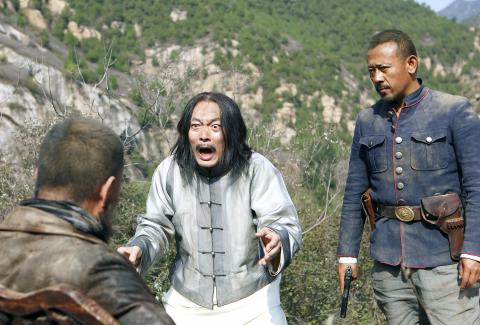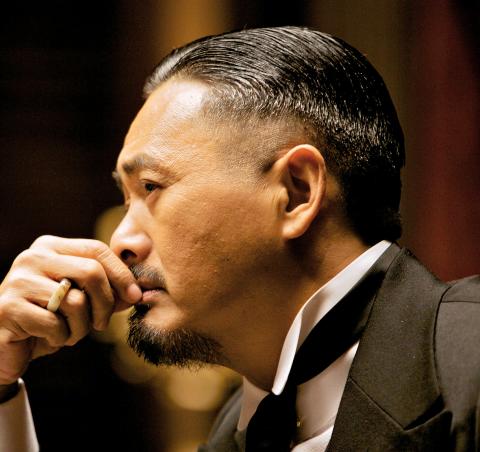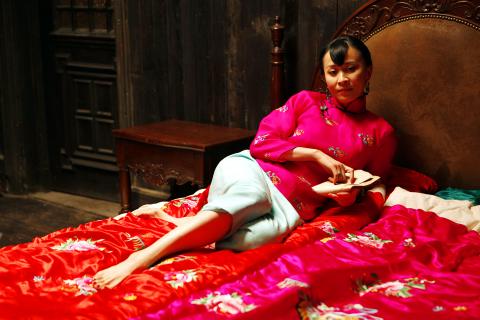Gunfights, razor-sharp humor and an arresting cat-and-mouse struggle between a bandit posing as a county governor and a local plutocrat — all wrapped in Western trappings and starring a peerless cast including Chow Yun-fat (周潤發), Ge You (葛優) and Jiang Wen (姜文). Let the Bullets Fly (讓子彈飛) by actor and director Jiang has all the ingredients for a blockbuster, and a blockbuster it is: The film raked in US$111 million in less than two months after it was released in China on Dec. 16 last year, becoming the country’s highest-grossing Chinese-language movie of all time.
Terrific performances and well-crafted story aside, the film’s immense success lies in the fact that it is readily embraced as a mirror of present-day China by Chinese viewers who find the political satire a welcome relief from life under an autocratic regime.
It all begins in 1919 China, a tumultuous time when the fledgling republic was divided among military cliques. Ma Bangde (played by Ge), a practiced conman, is en route to becoming the new governor of Goose Town when daredevil bandit Zhang Muzhi (played by Jiang) appears on a nearby hill and derails the train on which Ma is traveling with flying bullets.

Photo courtesy of Serenity Entertainment International
Appalled, the chameleonic Ma tells Zhang that he is just the governor’s counselor Tang, prompting the train robber to decide to pose as the governor and make a quick fortune out of the township’s rich and the powerful. But when the Robin Hood figure enters Goose Town with his entourage of bandits, who pretend to be officers, the gang discovers the lawless village is ruled by local kingpin and plutocrat Huang Silang (played by Chow).
Zhang’s material quest is quickly replaced by a vow of vengeance on Huang, who is responsible for the death of Zhang’s adoptive son Lao Liu (Zhang Mo, 張默). Machiavellian mind games ensue; shootouts and carnage erupt.
Based on the chapter Dao Guan Ji (盜官記) from Sichuan author Ma Shitu’s (馬識途) novel Ye Tan Shi Ji (夜譚十記), the film is reminiscent of works by Akira Kurosawa and Sergio Leone, and swings deftly between hilarity and brutal violence.

Photo courtesy of Serenity Entertainment International
The most gripping virtue of the period blockbuster is not gunfights, however, but brilliantly scripted battle strategies, witty dialogue and clever sophism. Snappy talk among the loquacious characters is a delight to the ears that resembles freestyle rap battles. Unfortunately, the complexity of the wordplay will be mostly lost in translation to audience members reliant on subtitles.
The film would lose much of its charm without the bravura acting by the three leading men, all at the top of their game. As a calculating heroic figure, Jiang shares electrifying onscreen chemistry with Ge, lovable as a smart-talking weasel and opportunist, while Chow elicits admiration for his seemingly effortless conveyance of a treacherous crook with a charming veneer. An equally dreamy host of supporters surround the trio, including Carina Lau (劉嘉玲) as Ma Bangde’s capricious wife, Chen Kun (陳坤) playing Huang’s sidekick, and Hu Jun (胡軍), making a cameo appearance as a pock-faced imposter.
But the star appeal pales under the avalanche of heated discussions on China’s blogosphere, with critics, scholars and general audiences looking for subtexts inside the political allegory while gleefully marveling at the fact that the movie could slip through the watchful eyes of the State Administration of Radio Film and Television, the nation’s censorship body. (The authority did reportedly ask movie theaters across the country to reduce screenings soon after its commercial release.)

Photo courtesy of Serenity Entertainment International
With the media tightly controlled and society closely watched, it is no surprise that a blatant stab at corruption and rough justice is celebrated by people who can read the story in any number of ways. Some say that Goose Town is China and that Huang represents totalitarian dictatorship and capitalism, while Zhang embodies the left-wing ideals and legacy of Mao Zedong (毛澤東). Others seek out the Tiananmen Square Massacre (or June Fourth Incident, 六 四事件), with Lao Liu (老六) the victim and Huang Silang (黃四郎) the perpetrator, and believe the Goose Town’s open square, which no inhabitants dare set foot on, stands for Tiananmen Square. The horse (馬)-drawn train (列車) is amusingly interpreted as Marxist-Leninist (馬列主義). The train heads directly to Shanghai, a model example of Chinese economic reform, at the end of the film.
With its immensely commercial appeal, Let the Bullets Fly, Jiang’s fourth feature, is a world apart from the director’s previous art-house creations, such as The Sun Also Rises (太陽照常升起, 2007). Perhaps he adopts the populist approach for good reason, because to the Chinese masses, the film’s message is loud and clear: The revolution is yet to come, so let the bullets fly, at least until the state’s censorship apparatus catches on.

In the next few months tough decisions will need to be made by the Taiwan People’s Party (TPP) and their pan-blue allies in the Chinese Nationalist Party (KMT). It will reveal just how real their alliance is with actual power at stake. Party founder Ko Wen-je (柯文哲) faced these tough questions, which we explored in part one of this series, “Ko Wen-je, the KMT’s prickly ally,” (Aug. 16, page 12). Ko was open to cooperation, but on his terms. He openly fretted about being “swallowed up” by the KMT, and was keenly aware of the experience of the People’s First Party

Aug. 25 to Aug. 31 Although Mr. Lin (林) had been married to his Japanese wife for a decade, their union was never legally recognized — and even their daughter was officially deemed illegitimate. During the first half of Japanese rule in Taiwan, only marriages between Japanese men and Taiwanese women were valid, unless the Taiwanese husband formally joined a Japanese household. In 1920, Lin took his frustrations directly to the Ministry of Home Affairs: “Since Japan took possession of Taiwan, we have obeyed the government’s directives and committed ourselves to breaking old Qing-era customs. Yet ... our marriages remain unrecognized,

During the Metal Ages, prior to the arrival of the Dutch and Chinese, a great shift took place in indigenous material culture. Glass and agate beads, introduced after 400BC, completely replaced Taiwanese nephrite (jade) as the ornamental materials of choice, anthropologist Liu Jiun-Yu (劉俊昱) of the University of Washington wrote in a 2023 article. He added of the island’s modern indigenous peoples: “They are the descendants of prehistoric Formosans but have no nephrite-using cultures.” Moderns squint at that dynamic era of trade and cultural change through the mutually supporting lenses of later settler-colonialism and imperial power, which treated the indigenous as

Standing on top of a small mountain, Kim Seung-ho gazes out over an expanse of paddy fields glowing in their autumn gold, the ripening grains swaying gently in the wind. In the distance, North Korea stretches beyond the horizon. “It’s so peaceful,” says the director of the DMZ Ecology Research Institute. “Over there, it used to be an artillery range, but since they stopped firing, the nature has become so beautiful.” The land before him is the demilitarized zone, or DMZ, a strip of land that runs across the Korean peninsula, dividing North and South Korea roughly along the 38th parallel north. This